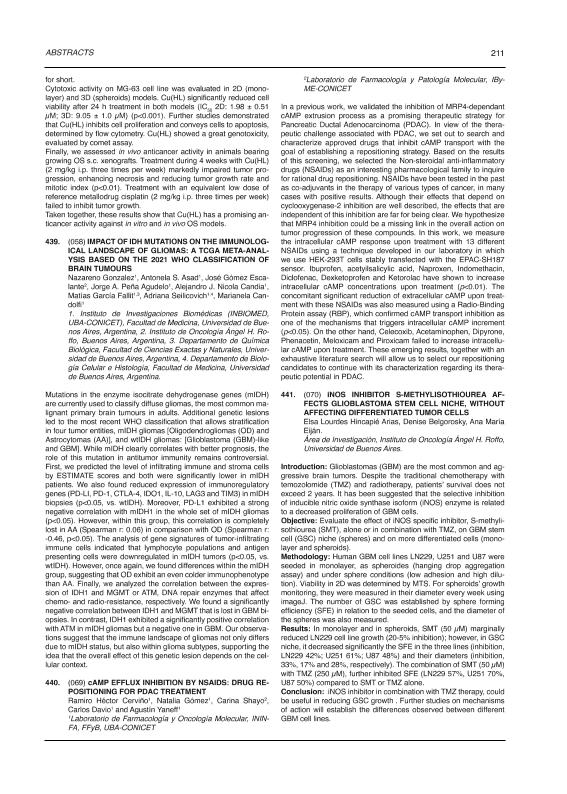Evento
Impact of IDH mutations on the immunological landscape of gliomas: a TCGA meta-analysis based on the 2021 WHO classification of brain tumours
González, Nazareno ; Asad, Antonela Sofía
; Asad, Antonela Sofía ; Gómez Escalante, José; Peña Agudelo, Jorge Armando; Nicola Candia, Alejandro Javier
; Gómez Escalante, José; Peña Agudelo, Jorge Armando; Nicola Candia, Alejandro Javier ; Garcia Fallit, Matías
; Garcia Fallit, Matías ; Seilicovich, Adriana
; Seilicovich, Adriana ; Candolfi, Marianela
; Candolfi, Marianela
 ; Asad, Antonela Sofía
; Asad, Antonela Sofía ; Gómez Escalante, José; Peña Agudelo, Jorge Armando; Nicola Candia, Alejandro Javier
; Gómez Escalante, José; Peña Agudelo, Jorge Armando; Nicola Candia, Alejandro Javier ; Garcia Fallit, Matías
; Garcia Fallit, Matías ; Seilicovich, Adriana
; Seilicovich, Adriana ; Candolfi, Marianela
; Candolfi, Marianela
Tipo del evento:
Reunión
Nombre del evento:
LXVI Reunión anual de la Sociedad Argentina de Investigación Clínica; LXIX Reunión Anual de la Sociedad Argentina de Inmunología; LIII Reunión Anual de la Asociación Argentina de Farmacología Experimental y XI Reunión Anual de la Asociación Argentina de Nanomedicinas
Fecha del evento:
17/11/2021
Institución Organizadora:
Sociedad Argentina de Investigación Clínica;
Asociación Argentina de Farmacología Experimental;
Sociedad Argentina de Inmunología;
Asociación Argentina de Nanomedicinas;
Título de la revista:
Medicina (Buenos Aires)
Editorial:
Fundación Revista Medicina
ISSN:
1669-9106
Idioma:
Inglés
Clasificación temática:
Resumen
Mutations in the enzyme isocitrate dehydrogenase genes (mIDH) are currently used to classify diffuse gliomas, the most common malignant primary brain tumours in adults. Additional genetic lesions led to the most recent WHO classification that allows stratification in four tumor entities, mIDH gliomas [Oligodendrogliomas (OD) and Astrocytomas (AA)], and wtIDH gliomas: [Glioblastoma (GBM)-like and GBM]. While mIDH clearly correlates with better prognosis, the role of this mutation in antitumor immunity remains controversial. First, we predicted the level of infiltrating immune and stroma cells by ESTIMATE scores and both were significantly lower in mIDH patients. We also found reduced expression of immunoregulatory genes (PD-LI, PD-1, CTLA-4, IDO1, IL-10, LAG3 and TIM3) in mIDH biopsies (p<0.05, vs. wtIDH). Moreover, PD-L1 exhibited a strong negative correlation with mIDH1 in the whole set of mIDH gliomas (p<0.05). However, within this group, this correlation is completely lost in AA (Spearman r: 0.06) in comparison with OD (Spearman r: -0.46, p<0.05). The analysis of gene signatures of tumor-infiltrating immune cells indicated that lymphocyte populations and antigen presenting cells were downregulated in mIDH tumors (p<0.05, vs. wtIDH). However, once again, we found differences within the mIDH group, suggesting that OD exhibit an even colder immunophenotype than AA. Finally, we analyzed the correlation between the expression of IDH1 and MGMT or ATM, DNA repair enzymes that affect chemo- and radio-resistance, respectively. We found a significantly negative correlation between IDH1 and MGMT that is lost in GBM biopsies. In contrast, IDH1 exhibited a significantly positive correlation with ATM in mIDH gliomas but a negative one in GBM. Our observations suggest that the immune landscape of gliomas not only differs due to mIDH status, but also within glioma subtypes, supporting the idea that the overall effect of this genetic lesion depends on the cellular context.
Palabras clave:
IDH
,
GLIOMA
,
META-ANALYSIS
Archivos asociados
Licencia
Identificadores
Colecciones
Eventos(INBIOMED)
Eventos de INSTITUTO DE INVESTIGACIONES BIOMEDICAS
Eventos de INSTITUTO DE INVESTIGACIONES BIOMEDICAS
Citación
Impact of IDH mutations on the immunological landscape of gliomas: a TCGA meta-analysis based on the 2021 WHO classification of brain tumours; LXVI Reunión anual de la Sociedad Argentina de Investigación Clínica; LXIX Reunión Anual de la Sociedad Argentina de Inmunología; LIII Reunión Anual de la Asociación Argentina de Farmacología Experimental y XI Reunión Anual de la Asociación Argentina de Nanomedicinas; Argentina; 2021; 1-1
Compartir



